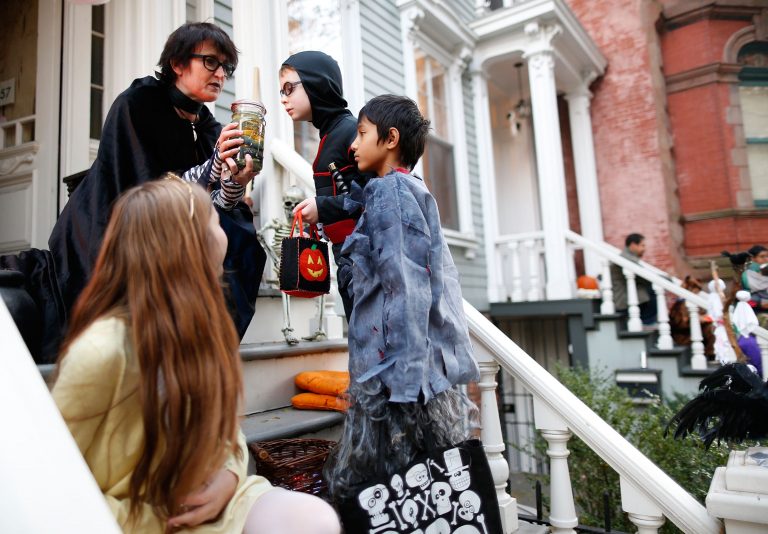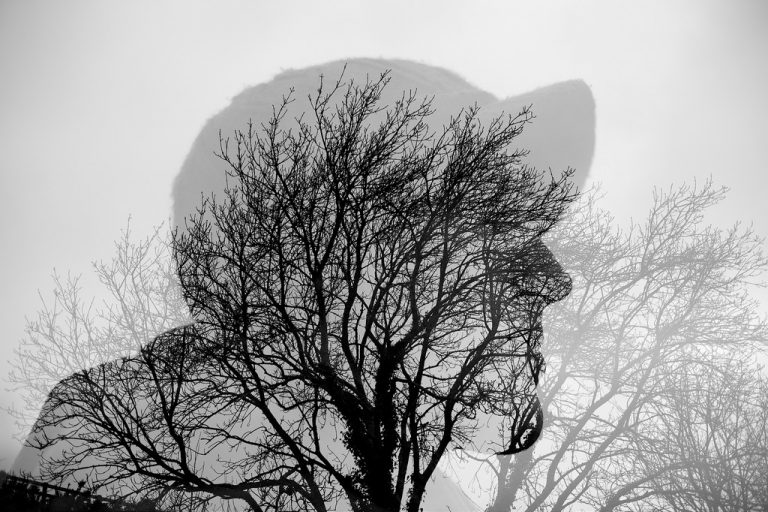
Image by Jemal Countess/Getty Images, © All Rights Reserved.
Why We Risk Hospitality on Halloween
There’s a trend in the trick-or-treat business that I find a little sad. It’s called “trunk-and-treat” and it’s popular in church parking lots.
The idea is that open car trunks are decked out in Halloween decor (usually not the gross or scary stuff), stocked with lots of candy, and then pirates and ladybugs, superheroes and Disney princesses go car to car filling up their treat bags.
I understand the rationale: it’s considered safe for the kids; it’s a no hassle, one-stop-shopping excursion; there’s some stimulation for the adults as they have other adults to talk to.
And it’s part of a larger effort in many churches (especially in the south) to remove Halloween from local neighborhoods and park it on the church grounds, literally — to clean up the holiday’s image and minimize its dark undertones.
But the thing is, Halloween has always been connected to Christianity, and its preoccupation with death is inseparable from its religious roots.
All Saints’ Day, November 1 — the day that Christians commemorate the saints of the Church who have died — is also known as All Hallows’. So October 31 is All Hallows’ Eve or Even, contracted from the Old English into “Hallowe’en.”
November 1 was also the beginning of the new year for the ancient Celts. October 31 marked the end of their growing season and on that night they would pay tribute to the spirit world with gifts of food to insure that next year’s crop would be bountiful. It was a time for communicating with the dead and receiving wisdom from the ancestors to help secure future prosperity.
And so All Hallows’ Eve has always been intertwined with the agricultural rituals of Celtic folk religion. In ancient times huge bonfires were set in order to frighten away evil spirits. In medieval times the pagan and Christian traditions merged, with children going door to door begging for “soul cakes” for the wandering spirits. If no treats were offered, the beggars would play pranks. Trick or treat.
This crisscrossing of the pagan and Christian is not unusual in the Church’s history and is no cause for alarm. Christmas, for example, is celebrated on December 25 not because this is the date of Jesus’ birth — no one knows when he was born — but because of a popular Roman celebration. Saturnalia, a festival devoted to Saturn (and before that to the sun god Mithra), was a raucous affair of much feasting and merry-making.
Church authorities tried forbidding it, insisting that Christians not take part, but to no avail. So they adopted it, adapted it, and in the year 336 turned it into the commemoration of the nativity: Christmas, the “Christ mass.” And many of the beloved traditions we associate with Christmas — garlands of greenery, trees lit with candles, the yule log — have their roots in these pagan, pre-Christian traditions.
And so, too, with the traditions of Halloween: the carved pumpkins, our fascination with death, dressing up and going door to door. I don’t want to get too heavy-handed with the theological significance of these rituals, but there is something to the idea that we open our door to strangers on a dark, autumn night, a grinning lantern on the porch to light their way. It’s a small gesture of hospitality, a willingness to want to know our neighbors. (Of course, it’s also about the candy.)
There’s also something about the risks of hospitality and neighborliness in Halloween’s rituals. Sometimes doors are closed and locked, houses dark — hospitality denied, neighborliness feared. The work of community is harder than we think. But when we offer a gift to a stranger (a cup of cold water, a Snickers bar on Halloween), we are also learning to receive gifts from strangers — to be transformed by encountering Christ in them. They might be wearing a mask (a vampire mask, say, or the mask of loneliness or irritability), but we all wear masks, all the time. Discarding them is the work of a lifetime.
Halloween in a parking lot is safe and of course we want our children to be safe. But opening our doors on the night before All Saints’ Day can be a surprising gift of grace — hospitality given and hospitality received. Death comes for us all but, until then, dare we give ourselves away in small gestures of friendship and neighborliness?

